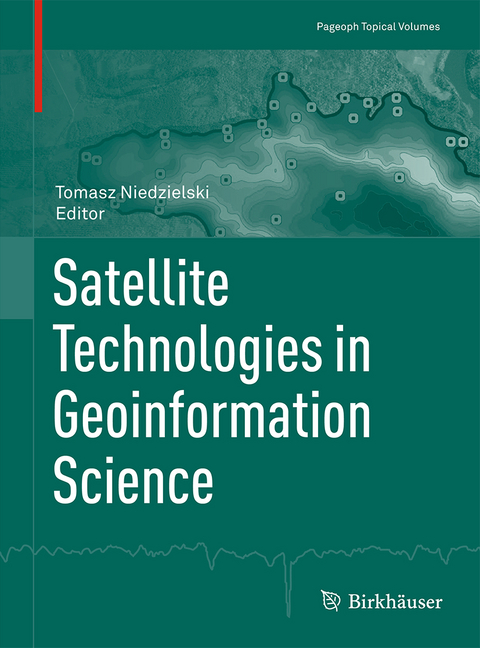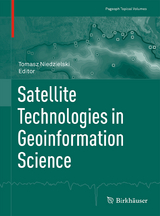Satellite Technologies in Geoinformation Science
Springer Basel (Verlag)
978-3-0348-0849-1 (ISBN)
This topical volume covers a wide range of multidisciplinary topics, the common theme of which is processing of remotely-acquired spatial data using geo information methods. Satellite or airborne technologies and geo information itself provide powerful tools for solving numerous scientific problems in the geosciences, as they utilize geophysical principles and offer geophysicists new data and methods. Accordingly, this topical volume focuses on six key topics, presenting research applications of satellite or airborne technologies in geodynamics, geomorphology, meteorology and climatology, hydrology and limnology, oceanography and cartography. These applications make use of numerous remote sensing or observational platforms, including: Light Detection and Ranging (LiDAR), Airborne Laser Scanning (ALS), Rapid Eye, Shuttle Radar Topography Mission (SRTM), Landsat-7, Enhanced Thematic Mapper Plus (ETM+), Moderate-resolution Imaging Spectroradiometer (MODIS), Global Navigation SatelliteSystem (GNSS), Satellite Laser Ranging (SLR), Lunar Laser Ranging (LLR), Doppler Orbitography and Radio positioning Integrated by Satellite (DORIS), as well as several altimetric and gravimetric satellite missions. The remotely-sensed data are processed using various geo information techniques, e.g. spatial interpolation and modeling, object-based image analysis, statistical and geo statistical inference and visualization.
The volume addresses the interests of scientists and practitioners whose work is related to processing remote sensing data using geoinformation methods. Postgraduate students of geography, geodesy, cartography and geophysics - as well as students of the broader geosciences - will also find the book to be a valuable resource, as it brings together numerous satellite and airborne technologies with geospatial processing methods, presents case studies and examines most applications in the context of basic geophysical principles.
Tomasz Niedzielski is professor at the Faculty of Earth Science and Environmental Management of the University of Wrocław, Poland.
Satellite Technologies in Geoinformation Science: Introduction.- Global, Regional and National Geodetic Reference Frames for Geodesy and Geodynamics.- Modelling the Velocity Field in a Regular Grid in the Area of Poland on the Basis of the Velocities of European Permanent Stations.- LiDAR and 2D Electrical Resistivity Tomography as a Supplement of Geomorphological Investigations in Urban Areas: a Case Study from the City of Wroclaw (SW Poland).- Aerial Orthophoto and Airborne Laser Scanning as Monitoring Tools for Land Cover Dynamics: A Case Study from the Milicz Forest District (Poland).- Quantitative and Qualitative Assessment of Soil Erosion Risk in Malopolska (Poland), Supported by an Object-Based Analysis of High-Resolution Satellite Images.- Assessment of the Accuracy of SRTM C- and X-Band High Mountain Elevation Data: a Case Study of the Polish Tatra Mountains.- Land Surface Temperature Patterns in the Urban Agglomeration of Krakow (Poland) Derived from Landsat-7/ETM+ Data.- Remote Sensing Data in Wind Velocity Field Modelling: a Case Study from the Sudetes (SW Poland).- Determination of Ventilation Channels In Urban Area: A Case Study of Wroclaw (Poland).- Geospatial Investigation into Groundwater Pollution and Water Quality Supported by Satellite Data: A Case Study from the Evros River (Eastern Mediterranean).- Application of Integrated GNSS/Hydroacoustic Measurements and GIS Geodatabase Models for Bottom Analysis of Lake Hancza: the Deepest Inland Reservoir in Poland.- Biogeography of the Oceans: a Review of Development of Knowledge of Currents, Fronts and Regional Boundaries from Sailing Ships in the Sixteenth Century to Satellite Remote Sensing.- Use of Remotely-Derived Bathymetry for Modelling Biomass in Marine Environments.- Prototypes of Orthoimage Maps as Tools for Geophysical Application.- Towards a More Realistic Depiction of the Earth's Surface on Maps.- Satellite-Based Technologies in Use for Extreme Nocturnal Mountain Rescue Operations: a Synergetic Approach Applying Geophysical Principles.
| Erscheint lt. Verlag | 15.8.2014 |
|---|---|
| Reihe/Serie | Pageoph Topical Volumes |
| Zusatzinfo | VI, 310 p. |
| Verlagsort | Basel |
| Sprache | englisch |
| Maße | 193 x 260 mm |
| Gewicht | 669 g |
| Themenwelt | Naturwissenschaften ► Biologie ► Ökologie / Naturschutz |
| Naturwissenschaften ► Geowissenschaften ► Geologie | |
| Naturwissenschaften ► Geowissenschaften ► Geophysik | |
| Naturwissenschaften ► Geowissenschaften ► Meteorologie / Klimatologie | |
| Naturwissenschaften ► Physik / Astronomie ► Angewandte Physik | |
| Technik ► Umwelttechnik / Biotechnologie | |
| Schlagworte | airbone and satellite technologies • geoinformation methods • object-based image analysis • remote sensing or observational platforms • spatial interpolation and modelling • statistical and geostatistical inference |
| ISBN-10 | 3-0348-0849-6 / 3034808496 |
| ISBN-13 | 978-3-0348-0849-1 / 9783034808491 |
| Zustand | Neuware |
| Haben Sie eine Frage zum Produkt? |
aus dem Bereich




